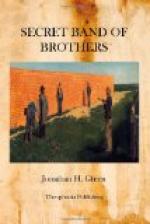Mr. Freeman announced that on Wednesday next, he would deliver a lecture, in which he would review his course of life, and offer arguments against gambling—which he freely confessed to be a vice, even while he proclaimed his right to practise it. Such an exposition cannot fail to be of deep interest.
From the Inquirer.
This controversy was continued on Saturday evening, Dr. Elder in the chair. The Lecture-room at the Chinese Museum was crowded on the occasion.
Mr. Freeman commented on the notice taken by the press of the controversy—in general it was manly and dignified; Mr. Freeman read from the Post, in which gambling was severely opposed. The ground on which Mr. Freeman had canvassed this matter was, he contended, in accordance with Blackstone, Paley, and other great men, who thought—namely, that a man had a right to do what he liked with his own things. Mr. Freeman held that a thing might be legally right and morally wrong. A man had a legal right (he contended) to gamble—but in a moral light he would not defend it. Suppose a man had two sons, and, from some trivial cause, he resolved to cut off one of them with a shilling. He had a legal right so to do—but perhaps he was morally wrong. Mr. Freeman answered an article that had appeared in the Post. Mr. Freeman contended that young men who engaged in gambling, did so generally from a bad system of education.
The Post had contended, in opposition to Mr. Freeman’s maxim that a man had a right to do what he pleased with his own things, so long as he did not interfere with others, that gambling did interfere with the rights of others; for example, it might prevent men from paying their debts, or it might prompt them to commit suicide, either of which was a wrong to society. Mr. Freeman contended, nevertheless, that a man had such a right—certainly he had, if he were not in debt—but if he were, it was then his duty to live as long as he could, to endeavour to pay his debts. Mr. Freeman illustrated his points by allusions to Gen. Taylor and Gen. Jackson—adding, “let the truth be told if the heavens fall.”
Mr. Freeman again opposed the new law passed against gambling—for, he said, it was so shaped, that if a man of property gambled, he could not be troubled, but a poor, itinerant gambler could be punished. Mr. Freeman read the law in proof—wherein a difference certainly appeared to be made between those who had something to live upon, and a merely itinerant gambler—the latter liable to imprisonment if he kept a gaming house, of from one to five years. Indeed, “being without a fixed residence” is one of the features of the law. Such a law appeared to Mr. Freeman as if, for example, a man of standing were to go into a store and steal, he would be let off—– whereas, if an itinerant man were to steal, he must be punished with years of imprisonment. The cases were parallel, and yet, it seemed to him that a man of good standing




